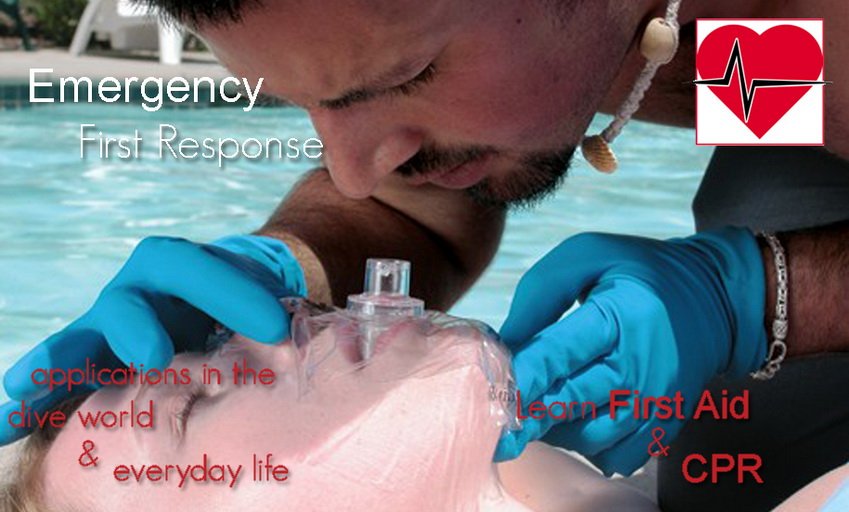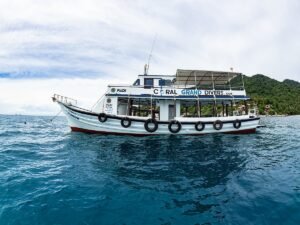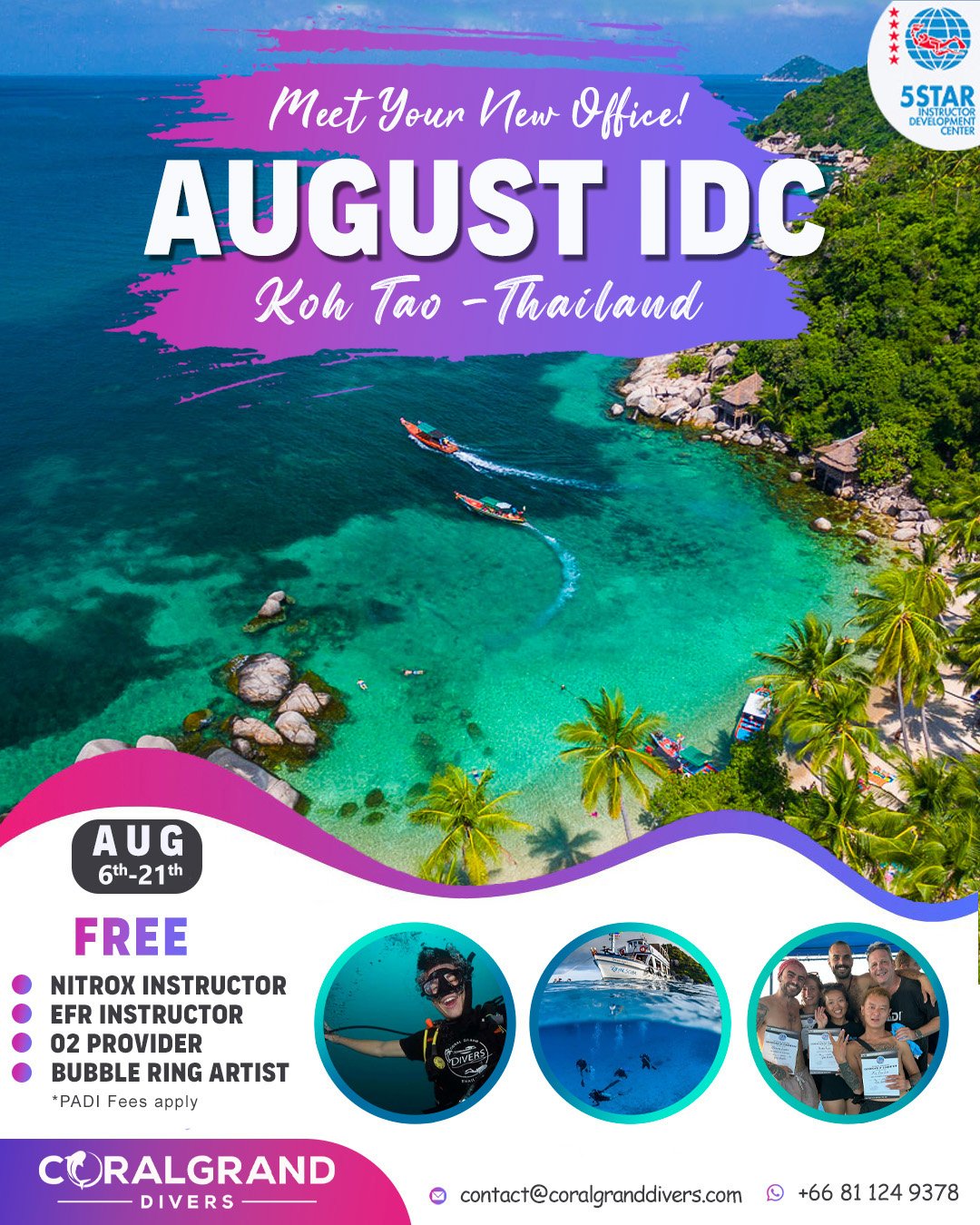Introduction to IDC Koh Tao
Koh Tao, a picturesque island in Thailand, stands as an epicenter for diving aficionados from across the globe. With its crystal-clear waters, vibrant coral reefs, and an abundance of marine life, it’s no wonder that Koh Tao is a magnet for those passionate about the underwater world. Among the various diving courses available, the Instructor Development Course (IDC) holds a special place, offering a pathway for divers to elevate their skills and careers.
The IDC is a pivotal step for divers aiming to become certified instructors. Recognized worldwide, this course equips candidates with the knowledge and skills required to teach diving at various levels. Its importance in the diving community cannot be overstated, as it ensures that future instructors are proficient, safe, and capable of providing high-quality education to new divers. The rigorous training and comprehensive curriculum of the IDC make it a cornerstone in the professional diving journey.
Choosing Koh Tao for the IDC comes with numerous advantages. The island’s natural beauty and thriving underwater ecosystem create an ideal environment for both learning and recreation. Divers can explore a multitude of dive sites, each offering unique experiences and challenges that enrich the training process. Additionally, Koh Tao boasts a robust community of dive professionals, fostering a supportive and collaborative atmosphere for IDC candidates. The synergy among dive schools, instructors, and students contributes to a dynamic learning environment that is both engaging and effective.
In summary, Koh Tao’s allure as a top diving destination is complemented by its exceptional IDC programs. The combination of stunning natural surroundings, rich marine biodiversity, and a strong network of diving experts makes Koh Tao an unparalleled choice for those aspiring to advance their diving careers. Whether drawn by the island’s serene beauty or the promise of comprehensive training, IDC candidates will find Koh Tao to be an inspiring and rewarding location to embark on their professional diving journey.
Nitrox and O2 Specialty Instructor Course
Nitrox and Oxygen (O2) diving are specialized areas within the scuba diving community that offer unique benefits and opportunities for divers. Nitrox diving, also known as Enriched Air Nitrox (EANx), involves the use of a gas mixture with a higher percentage of oxygen than the typical 21% found in atmospheric air. This allows divers to extend their bottom time and reduce nitrogen absorption, thereby diminishing the risk of decompression sickness. On the other hand, O2 diving focuses specifically on the use of oxygen-enriched gases, which can be critical for certain types of technical diving and emergency scenarios.
Becoming a Nitrox and O2 Specialty Instructor in Koh Tao is highly advantageous for several reasons. Firstly, it enhances the instructor’s credentials and expertise, making them more versatile and valuable within the diving industry. Secondly, it enables instructors to educate and certify other divers in these specialized areas, thereby promoting safer diving practices. This course is particularly beneficial for those who aim to work in environments where extended bottom time and advanced safety measures are paramount.
The Nitrox and O2 Specialty Instructor Course in Koh Tao is structured to provide both theoretical knowledge and practical skills. Participants will delve into the principles of gas blending, the physiological effects of different gas mixtures, and the best practices for planning and conducting dives using Nitrox and oxygen-enriched gases. The course typically includes classroom sessions, hands-on training, and open water dives to ensure comprehensive learning.
Requirements for this course generally include a minimum of Advanced Open Water Diver certification and a certain number of logged dives, demonstrating the participant’s experience and proficiency in diving. Upon successful completion, participants will be certified to teach and certify other divers in Nitrox and O2 diving specialties. This not only expands their professional capabilities but also contributes to the overall safety and advancement of the diving community.
Emergency First Response Instructor Course
The Emergency First Response (EFR) Instructor Course is an essential component for those pursuing the Instructor Development Course (IDC) in Koh Tao. The importance of emergency response skills in diving cannot be overstated, as they equip instructors with the knowledge and confidence to handle various situations that may arise underwater.
The EFR Instructor Course comprehensively covers critical areas such as Cardiopulmonary Resuscitation (CPR), first aid, and the use of Automated External Defibrillators (AEDs). These skills are pivotal not just for diving emergencies but also for everyday situations where immediate response could save lives. Participants will learn how to assess and respond to medical emergencies effectively, manage injuries, and provide essential care until professional medical assistance is available.
Undertaking the EFR Instructor Course complements a diving instructor’s skill set by adding another layer of competency. It ensures that the instructor is not only proficient in diving techniques but also capable of delivering essential first aid training to their students. This dual capability enhances the safety and preparedness of the diving community.
The course duration typically spans over two days and includes both theoretical and practical sessions. Prerequisites for enrolling in the EFR Instructor Course generally include a current Emergency First Response Primary and Secondary Care (CPR and First Aid) certification. Having this certification ensures that candidates have a foundational understanding of emergency response before advancing to instructor level.
Upon successful completion of the course, participants receive an EFR Instructor certification, which opens up numerous opportunities. Certified EFR Instructors can conduct EFR courses independently, thereby expanding their professional portfolio and increasing their marketability within the diving industry. This certification not only elevates their status as diving professionals but also contributes significantly to the overall safety and preparedness of the diving community in Koh Tao and beyond.
O2 Provider Course
The O2 Provider Course is an essential training program designed to equip divers with the knowledge and skills necessary to administer oxygen in emergency situations. This course is particularly valuable as it addresses the critical first steps in responding to diving-related incidents, where timely oxygen administration can significantly improve the outcome for the affected individual.
The curriculum of the O2 Provider Course is comprehensive and includes both theoretical and practical components. Participants will gain a thorough understanding of the physiological effects of oxygen on the body, the various types of oxygen delivery systems, and the scenarios in which oxygen administration is vital. The course emphasizes hands-on training, allowing students to practice using different oxygen equipment, such as demand valves, continuous flow masks, and non-rebreather masks. This practical experience ensures that divers are confident and competent in providing oxygen support when required.
One of the key aspects covered in the course is the identification of symptoms that necessitate oxygen administration. These symptoms can include decompression sickness, near-drowning incidents, and other dive-related injuries. By recognizing these signs early and administering the appropriate oxygen treatment, divers can mitigate the severity of the injuries and stabilize the condition of the affected individual until professional medical help arrives.
To enroll in the O2 Provider Course, participants must meet certain qualifications. Generally, individuals should be at least 12 years old and possess a basic understanding of diving principles. While it is advantageous to have prior first aid or CPR training, it is not a mandatory requirement for enrollment. Upon successful completion of the course, participants will receive an official certification, which is often recognized and respected by diving organizations worldwide.
In summary, the O2 Provider Course is a crucial addition to any diver’s skill set. It not only enhances safety during diving activities but also empowers divers to act effectively in emergencies, potentially saving lives. The knowledge and practical experience gained from this course are invaluable assets that contribute to the overall safety and preparedness of the diving community.
Becoming a Bubble Ring Artist at Coral Grand Divers
One of the unique and entertaining experiences offered at Coral Grand Divers in Koh Tao is the opportunity to become a bubble ring artist. This skill, which involves creating perfect, mesmerizing rings of air underwater, is not only a delightful recreational activity but also a valuable teaching tool for divers.
Bubble ring artistry is the practice of forming circular rings of air that travel upwards through the water, maintaining their shape and structure. The process may seem simple, but it requires precise control and technique. To create a bubble ring, a diver must blow a controlled burst of air from their mouth or use their tongue to push air through pursed lips. Mastering this skill involves understanding the dynamics of water pressure, buoyancy, and airflow, which adds an educational dimension to the practice.
The training process at
is thorough and engaging. Beginners start with basic techniques, such as learning to control their breath and understanding the best body position for creating bubble rings. Instructors guide students through step-by-step processes, ensuring they gain confidence and competence. As divers progress, they can experiment with different sizes and shapes of bubble rings, adding an element of creativity and personal expression to the activity.
Becoming proficient in bubble ring artistry offers numerous benefits. For recreational divers, it enhances their underwater experience, providing a fun and relaxing way to interact with the marine environment. For diving instructors, it serves as an effective teaching tool, helping to illustrate concepts such as buoyancy control and airflow management in a visually engaging manner. Additionally, the ability to create bubble rings can be a delightful way to capture the interest and imagination of new divers, making their diving experience memorable.
At Coral Grand Divers, the emphasis on mastering this entertaining skill highlights the center’s commitment to offering a well-rounded and enjoyable diving education. Whether for personal enjoyment or as a teaching aid, bubble ring artistry is a unique and valuable addition to any diver’s repertoire.
Life on Koh Tao for Diving Instructors
For those who have completed their Instructor Development Course (IDC) and are working as diving instructors, life on Koh Tao offers a unique blend of professional and personal fulfillment. The island’s vibrant diving community creates an inclusive social scene, fostering both professional growth and lifelong friendships. The work-life balance on Koh Tao is generally favorable, enabling instructors to enjoy the island’s natural beauty and recreational activities alongside their work commitments.
Professional opportunities abound on Koh Tao, with numerous dive shops and schools constantly seeking qualified instructors. This high demand allows for a relatively stable and rewarding career in diving. Many instructors find themselves working in environments that prioritize safety and education, thus enhancing their skills while contributing to the overall diving community.
Accommodation on the island ranges from budget-friendly hostels to more private bungalows and apartments. Many dive shops offer housing assistance or even include accommodations as part of their employment package. The cost of living on Koh Tao is relatively low compared to Western standards, making it easier for diving instructors to maintain a comfortable lifestyle. Basic necessities such as food, transportation, and utilities are affordable, and local markets provide fresh produce at reasonable prices.
The social life on Koh Tao is rich and varied. From beachfront bars to organized dive shop events, there are ample opportunities to connect with fellow instructors and diving enthusiasts. The island also offers various activities beyond diving, including yoga classes, hiking trails, and water sports, ensuring a well-rounded living experience.
Overall, living on Koh Tao as a diving instructor presents a harmonious blend of professional opportunities and personal enjoyment. The island’s supportive community, coupled with its natural beauty and affordable living costs, makes it an ideal location for those passionate about diving to build a fulfilling career and lifestyle.
“`html
Testimonials and Success Stories
Undoubtedly, real-life experiences offer the most genuine insights into the transformative impact of Instructor Development Courses (IDC) and specialty courses on individuals’ careers. Koh Tao, with its world-renowned diving schools, has been a cornerstone for many aspiring diving professionals. Here are some testimonials and success stories that encapsulate the journey and achievements of individuals who have embraced IDC in Koh Tao.
One such success story is that of Emma Johnson, who transitioned from a novice diver to a respected diving instructor. Emma recalls, “Completing my IDC in Koh Tao was a turning point in my career. The comprehensive training, coupled with the serene environment, made learning seamless. Today, I am a lead instructor at a prominent diving school in the Caribbean, and I owe much of my success to the solid foundation I built in Koh Tao.”
Similarly, David Lee’s experience highlights the exceptional quality of specialty courses offered in Koh Tao. “The Nitrox and Deep Diver specialty courses I took were instrumental in expanding my skill set. The hands-on approach and expert guidance provided by the instructors were phenomenal. These courses not only enhanced my technical skills but also boosted my confidence. I now manage diving expeditions in the Maldives, thanks to the expertise I gained in Koh Tao.”
Another inspiring story comes from Maria Garcia, who found a new passion and career path through the IDC program. “Before attending IDC in Koh Tao, I was working a routine desk job. The IDC program ignited a passion for diving that I never knew existed. The instructors were incredibly supportive and knowledgeable. Today, I run my own dive shop in Costa Rica, and I can’t imagine my life without diving.”
These testimonials underscore the profound impact that IDC and specialty courses in Koh Tao can have on one’s professional journey. The blend of high-quality education, experienced instructors, and the idyllic setting of Koh Tao creates an unparalleled environment for aspiring diving professionals to thrive and excel.
How to Enroll and What to Expect
Embarking on an Instructor Development Course (IDC) in Koh Tao is an exciting venture for any diving enthusiast looking to turn their passion into a profession. The enrollment process is streamlined to ensure a smooth transition from aspiring instructor to certified professional. To begin, prospective students need to select a PADI-affiliated dive center in Koh Tao that offers IDC programs. Most dive centers have online application forms that are straightforward and user-friendly.
Applicants must meet certain prerequisites to enroll in the IDC. These include being at least 18 years old, holding a PADI Divemaster certification or an equivalent qualification, and having logged a minimum of 60 dives. Additionally, candidates should have been a certified diver for at least six months and possess a medical statement signed by a physician within the last 12 months, clearing them for diving activities. It is also advisable to have completed an Emergency First Response (EFR) course within the past 24 months.
Preparation is key to ensuring success in the IDC. Candidates are encouraged to review their diving theory, practice their diving skills, and improve their physical fitness to meet the demands of the course. Familiarity with the PADI Instructor Manual and other relevant materials will also provide a solid foundation for the training ahead.
Once enrolled, participants can expect a rigorous but rewarding training schedule. Daily activities typically include classroom sessions, confined water skills practice, open water teaching presentations, and workshops on various diving subjects. The course is designed to develop both theoretical knowledge and practical teaching abilities, with assessments conducted throughout to gauge progress.
Assessment criteria include performance in theoretical exams, practical teaching presentations, and water skills demonstrations. Participants should be prepared for a comprehensive evaluation that tests their abilities to perform and teach diving skills effectively. The IDC culminates with the Instructor Examination (IE), a standardized assessment conducted by PADI examiners. Successful completion of the IE marks the beginning of a new journey as a certified PADI Instructor.
